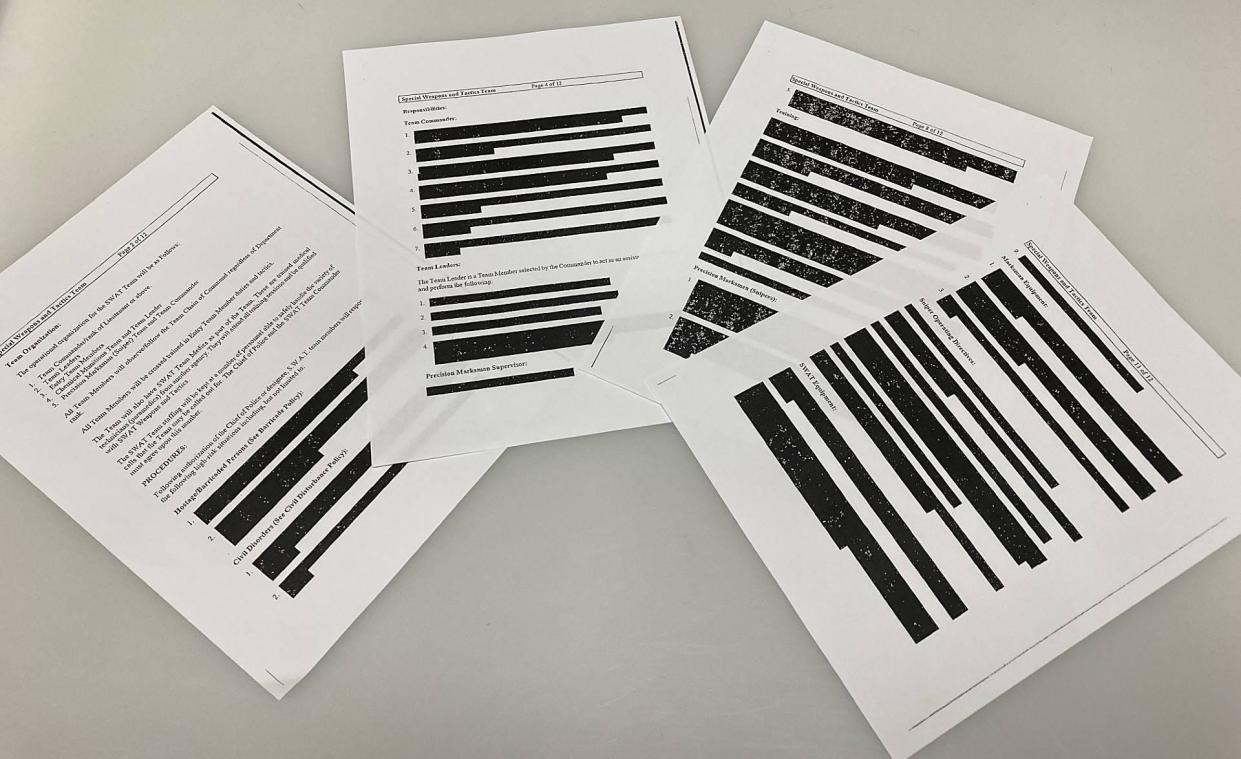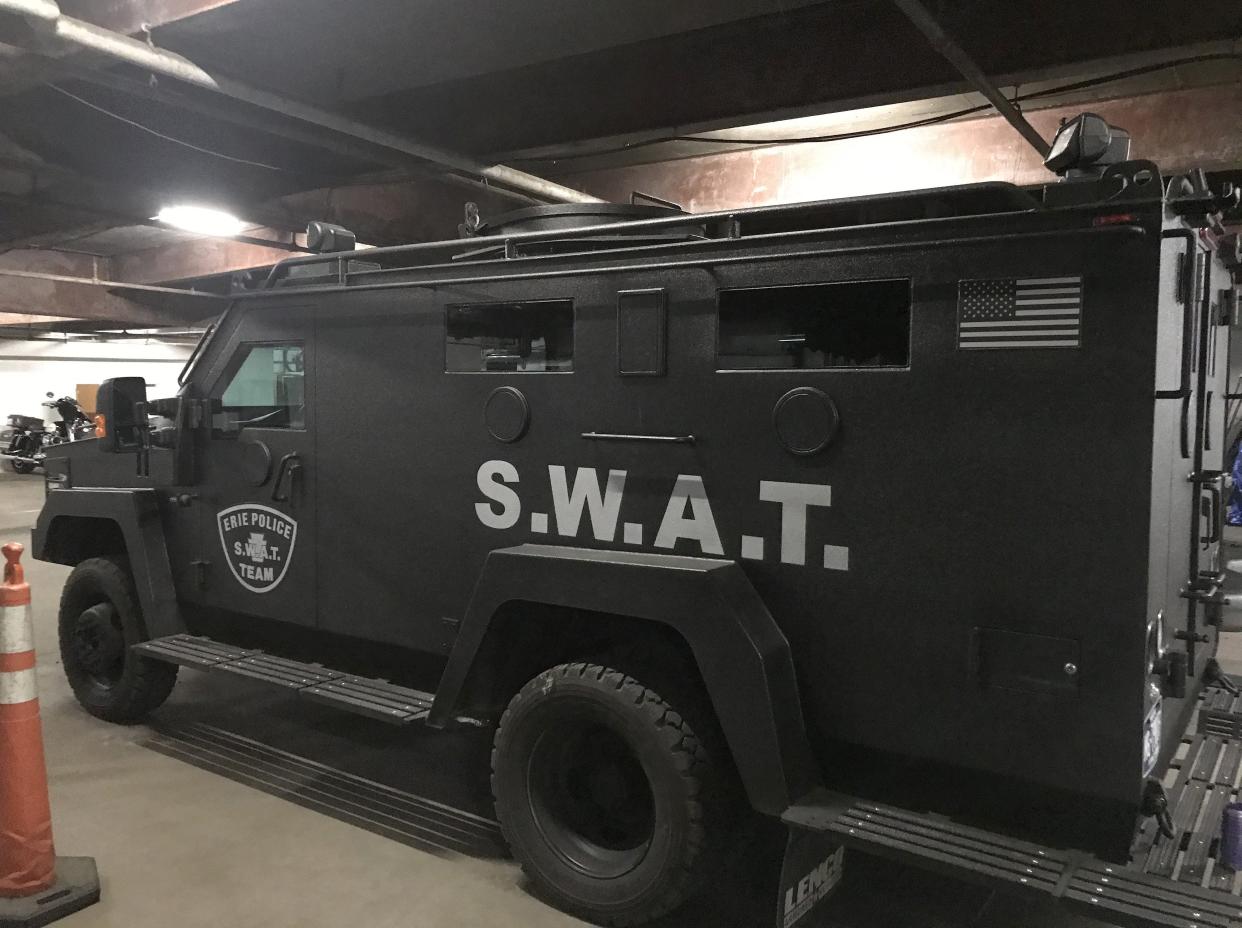In right-to-know case, judge rules against city of Erie after it blacks out police records
After it lost a case under the state's Right-to-Know Law, the city of Erie refused to release an unredacted copy of a document that it had been ordered to disclose. The order to provide the document came from the Pennsylvania Office of Open Records.
The city Solicitor's Office, working with the Bureau of Police, instead released a copy of the document with line after line blacked out.
The city redacted most of the 12 pages of the document — the policies and procedures for the Erie police's SWAT Team.
The city's decision could come with a financial cost.
Erie County President Judge Joseph M. Walsh III has ruled that the city erred when it refused to release an unredacted copy.
Walsh has ordered the city to produce "a complete and unredacted copy of its SWAT Policy" to the Erie lawyer who requested it, Timothy McNair, according to a two-page decision filed in Erie County Common Pleas Court on Dec. 19.
Walsh in the same decision said McNair may submit an application for attorney's fees and costs related to the lawsuit he filed in Common Pleas Court to force the city to release the unredacted document.

The Right-to-Know Law allows a judge to order a public agency that lost a case under the law to pay the winner's legal fees. The winner must show the public agency acted in bad faith by refusing to provide the requested documents if disclosure was warranted under the Right-to-Know Law.
The law also allows a court to "impose a civil penalty of not more than $1,500 if an agency denied access to a public record in bad faith."
McNair is arguing that the city showed bad faith by acting with "willful denial of access to the documents in question," according to court records.
Walsh gave McNair 30 days to submit the application for attorney's fees and costs.
McNair said he intends to file the application, and is he said he is pleased with Walsh's ruling that ordered the city to produce the unredacted policies and procedures for the SWAT Team.
"It validated our position all along — that this is a public document that should have been available," McNair said. "Whatever motivation they had for withholding it, they didn't have any justification."
The city's deputy solicitor, Jason Checque, is handling the case for the city. He said he is reviewing Walsh's order as the city decides what to do next.
The city has 30 days to decide whether it wants to appeal the ruling to state Commonwealth Court. A loss on appeal would add to the legal expenses that McNair could ask the city to repay. A win for the city would most likely invalidate McNair's request for the expenses and would free the city from having to produce the unredacted document.
Request for information linked to potential lawsuit
The case started on April 23. McNair filed a Right-to-Know Law request with the Erie police for a copy of its policies and procedures for its SWAT Team.
The request, McNair said in an interview, was related to his investigation of a case in which a client, Lance Thornton, claimed he was mistreated during a search of his residence in Millcreek Township on March 12.
Several Erie police officers were part of a task force that joined the U.S. Marshals Service in the search, McNair said in court records. Court records also show Thornton was not charged with a crime in the case.
On March 27, McNair signaled that Thornton planned to sue several Erie police officers and the city by filing a writ of summons — a precursor to a full-blown lawsuit — in Common Pleas Court. On June 6, the U.S. Attorney's Office in Pittsburgh had the case removed to U.S. District Court in Erie.

The U.S. Attorney's Office based the removal on its contention the U.S. Marshal's Service had deputized at least one of the Erie police officers for the search. The officer "was considered a federal officer acting within the course and scope of his task force employment under the direction of a federal officer," according the removal request.
The case remains in federal court. McNair has yet to file a full-blown lawsuit.
McNair appeals to Office of Open Records over document
In filing his request for the SWAT Team policies and procedures under the Right-to-Know Law, McNair did not state a reason for the request, and he did not have to. The law states, "A written request need not include any explanation of the requester's reason for requesting or intended use of the records unless otherwise required by law."
The police, through the Solicitor's Office, denied McNair's request for the SWAT policies and procedures on May 17. The office said the denial was based on the section of the Right-to-Know Law that exempts disclosure of a record whose release "would be reasonably likely to jeopardize or threaten public safety or public preparedness or public protection activity."
McNair appealed the denial to the state Office of Open Records on May 19. The office ruled in his favor.
McNair successfully argued that the city failed to prove how release of a copy of the SWAT Team's policies and procedures would jeopardize public safety. The city Solicitor's Office argued that the Right-to-Know Law exempted the document from disclosure because of the exception for public safety.
In its review, the Office of Open Records said the city failed to provide specific information as to how release of the document would undermine public safety.
Part of SWAT: Blast with a past: Erie Bomb Squad marks 50 years of service to northwestern Pennsylvania
The OOR hearing officer on the case, Erika Similo, also found that the city never acted on McNair's statement, made during the course of the appeal, that he would be willing to negotiate whether "any sensitive portions (could) be redacted" from the SWAT Team's policies and procedures before their release, according to Similo's ruling on the case.
Similo also said the city and the police, which she refers to as the Department, never took up her offer to provide her more information to explain how the release of the document would jeopardize public safety.
"Despite the OOR's attempts to further develop the record in this matter, the Department chose not to provide evidence describing the nature of the records, connecting the records to a reasonable likelihood that disclosure would threaten public safety or establishing that disclosure of the responsive records would impair the Department's ability to perform its public safety functions," according to the seven-page ruling, known as a final determination, issued July 24.
The only evidence the city provided, Similo said in the ruling, was an attestation that "merely repeats the statutory language by stating 'the disclosure and/or release of said policies and/or procedures is reasonably likely to jeopardize or threaten the public safety and/or that their disclosure and/or release would be reasonably likely to result in harm.'"
Similo explained why she ruled against the city.
"Because the applicability of the stated exemption is not clear from the face of the record and because an agency cannot rely on conclusory statements to sustain its burden of proof," according to the ruling, "the Department did not demonstrate that the responsive policies and procedures are exempt from disclosure."
City releases redacted document, despite OOR decision
Similo ordered the city to give McNair a copy of the policies and procedures of the SWAT Team within 30 days. Her order gave no authorization for the city to provide only a redacted copy.
The city did not appeal the OOR's decision to Common Pleas Court, as it could have. On Aug. 24, the day after the appeal period for the OOR ruling had expired, Checque, the deputy city solicitor, emailed McNair the redacted copy of the policies and procedures.
The information blacked out in the redacted copy — which is part of the court record — includes responsibilities for various SWAT Team personnel, including team leaders and the supervisor for the use of tear gas. Also blacked out is information on the selection process for SWAT Team members.
More Erie court news: Other lawsuits, criminal cases proceed
On Aug. 30, six days after he got the redacted document from the city, McNair sued the Erie police by filing what is known as a complaint in mandamus. He asked an Erie County judge to order the city to comply with the OOR decision and release an unredacted copy of the records.
"Even though no redactions were requested by the Department or authorized by the Office of Open Records," McNair said in the complaint, "the policy document is heavily redacted to the point where it is meaningless."
McNair attached a copy of the redacted document to the lawsuit. He argued that the redactions were evidence that the city had acted in bad faith in its handling of his request for the records.
"Its refusal to comply is contemptuous, obdurate and vexatious," McNair said in the complaint, "and is calculated to multiply the expense of obtaining public records that should have been provided immediately and is merely intended to delay Requester's receipt of the documents to which he is clearly entitled."
Right-to-Know request goes to court as lawyer, city battle
The case went to Judge Walsh. He held a hearing on McNair's complaint on Dec. 13.
Checque did not dispute the OOR's ruling. But he told Walsh that staffing changes in the Solicitor's Office might have caused the office to a miss a filing deadline in the case before the OOR.

Checque said he submitted the redacted document to McNair after meeting with the police and deciding what information should not be released.
"You self-evaluated," Walsh said.
Checque said the redactions were necessary to protect the public. He likened the SWAT Team policies and to some of the United States' most sensitive national-security information.
'"It is like someone asking the president of the United States, 'What are the nuclear codes?" Checque said.
McNair countered that the city never asked to redact the information during the proceedings before the OOR. He said he had a right to the unredacted version due to the OOR's decision.
"I am a citizen," McNair said, "and I want to determine if the police, in a particular instance, complied with the policies regarding the SWAT Team."
He said the Erie police, in his case, are "seeking blanket immunity from anyone checking up on them" and that the police are "not the ultimate authority."
"Our position is even the police must abide by the law," McNair said.
'This court is constrained to enforce OOR's mandate'
Walsh at the hearing reminded Checque that the city had to meet certain deadlines with the OOR and that it could have responded to the OOR during the appeal process.
He echoed that position when he ruled against the city on Dec. 19 and ordered the release of the unredacted document.
"The unappealed Final Determination of the Office of Open Records is binding on the parties and this court," Walsh said in his decision. He said the Erie police were provided an opportunity to support its position that the requested records were exempt from disclosure and "EPD failed or refused to do so."
Walsh also said: "There is no indication on the face of the Final Determination that any part of the SWAT Policy was deemed exempt from disclosure. In fact, to the contrary, OOR determined that EPD did not meet its burden to prove entitlement to any RTKL exemption. Absent appeal, this court is constrained to enforce OOR's mandate without further review."
Walsh ordered the city to turn over the unredacted records "forthwith." And he said McNair could submit an application for attorney's fees and costs.
As of Thursday, McNair said he had yet to receive the records as the city considers its next move.
Contact Ed Palattella at epalattella@timesnews.com. Follow him on X @ETNpalattella.
This article originally appeared on Erie Times-News: City of Erie loses right-to-know case over blacked-out police records
